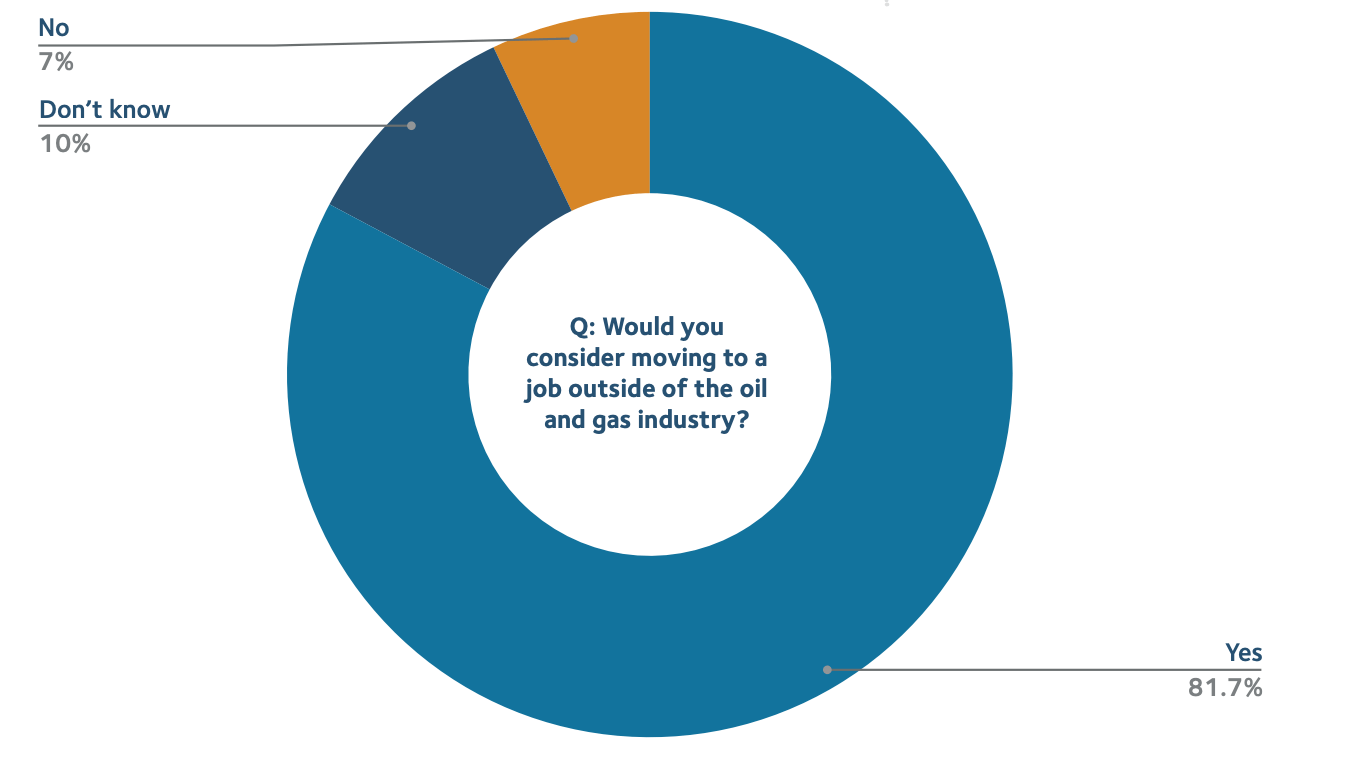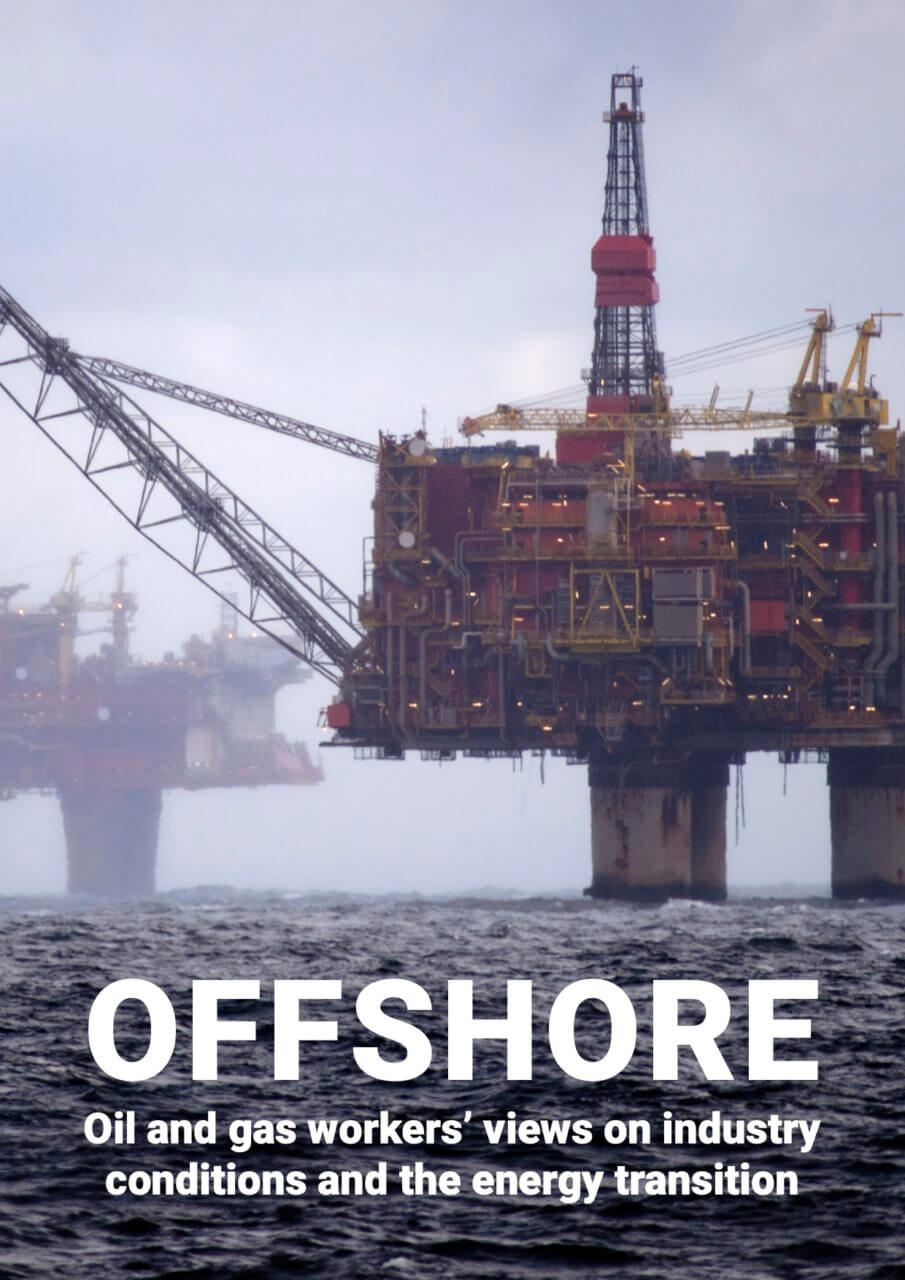This report builds on a survey of 1,383 offshore oil and gas workers to reveal the impact of Covid-19 on their lives, their views on life in the industry and their hopes and solutions for the energy transition. In addition to an analysis of the survey results, there are eight case studies from the workers themselves. Case studies and written survey responses show an exhaustion with precarity in oil and gas and a huge appetite for alternative industries, including offshore wind and other renewables.
Published by Platform, Friends of the Earth Scotland, and Greenpeace.
Key survey results include:
- 81% of offshore workers would consider leaving the industry
- 43% had been made redundant or furloughed since March 2020
- 91% of respondents had not heard of the term ‘just transition’
- Given the option of retraining to work elsewhere in the energy sector, more than half would be interested in renewables and offshore wind.
- Over 50% of workers deemed government support at all levels “nowhere near enough”
- Current job security satisfaction was rated 1.9 out of 5, with 58% of respondents also identifying job security as their top priority in considering changing industries
Workers have endured decades of chaos and upheaval as the oil markets boom and bust, which has been exacerbated by the pandemic. As the UK must transition to renewable energy, there is a danger things could get even worse for these workers, and the government must make sure they are not left behind.
One worker, Frank*, who has been in the industry for 40 years, said: “Morale is low, certainly in Aberdeen where 75% of the people are contractors… I know guys who have had two or three pay cuts over six months, no negotiations, nothing.”
Another states that, “It seems the oil companies have got away with everything but the workforce gets hammered… The way the industry is treating their workers, especially those in a situation similar to mine is an absolute disgrace and should not be allowed to happen.”
Workers in the oil and gas sector are well-informed and keen to express their views on conditions within the industry and how to build a future run on renewable energy, but their knowledge and expertise is untapped. Workers are willing to retrain and move to new sectors. They are open to change and job security is their biggest concern. They want secure and well paid work that makes use of their skills and experience.
A common theme from survey respondents was offering opportunities and financial support for retraining.
One person said: “Offer training to allow skills to be transferred from oil & gas to renewables sectors. Invest heavily in renewables. Encourage children, students, graduates away from an unsustainable oil and gas sector and into renewables. As Scotland has huge wind/wave/hydro resources she must become a front runner in the global renewables sector.”
And another stated: “Retrain while keeping a liveable wage. Last time there was a slump in oil prices there was opportunity to retrain but it was near impossible to navigate the red tape to get access to the training.”
As a consequence of the survey findings, Platform, Friends of the Earth Scotland and Greenpeace make three recommendations for government. You can find the recommendations in full in the report.
- The skills and experiences of oil and gas workers are essential in delivering an equitable and rapid transition to renewable energy. This requires engaging a representative section of the workforce in participatory policy-making, where workers are able to help determine policy, in addition to engagement with trade unions. The rhetoric of a just transition means nothing if impacted workers are not at the heart of shaping policies that affect their livelihoods and communities. It is the only means to ensure no harm to communities currently dependent on high-carbon industries.
- Improve job security and working conditions for workers in the oil and gas sector, to boost morale, improve quality of life, and mitigate the risk of workers leaving the energy sector altogether.
- Address barriers to entry and conditions within the renewables industry, including creating sufficient job opportunities, to harness the skills of oil and gas workers and enable an equitable and rapid energy transition.
However, we believe that top-down support will not be sufficient. Organising together is vital to assert workers’ voices at the core of the energy transition and control over their working conditions. It is the very power-relation between workers and employers that needs to change.
To support this shift in power balance towards increased workers’ control, a just transition requires the resurgence of rank and file trade union organising. The environmental movement also has a responsibility to take into account the effect its demands have on workers and to build solidarity with the labour movement.
Our call to action: There is no just transition if it is not worker-led. Following the completion of this survey, Platform, Friends of the Earth Scotland and Greenpeace will be running a participatory consultation of oil and gas workers across the UK. Workshops will enable energy workers to draft policy demands for a transition that works for them, and a renewables industry they want to work in. We welcome any energy workers, union branches, local communities, environmental groups or other stakeholders to get involved.

Report authors: Gabrielle Jeliazkov, Platform, Ryan Morrison, Friends of the Earth Scotland, Mel Evans, Greenpeace
Report contributors: Laurie Mompelat, Ben Lennon
Acknowledgements: Conducting and writing the survey and report would have been impossible without the input and guidance from the eight workers who acted as case studies, Jake Molloy, Robert Noyes, Neil Rothnie, Sakina Sheikh, and James Marriott. Most importantly, we thank all the offshore workers who gave their thoughts and time to this project.
